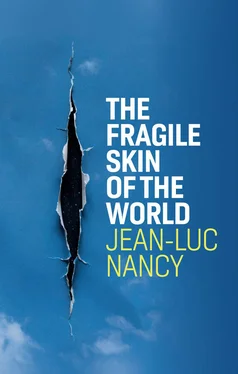It is thus necessary for us to extricate ourselves from mourning as well as from the representation that we mourn: that of mastered history. This speaks to the ambivalence of the term ‘Anthropocene’: it is understandable (at least partially) if it designates the substitution of natural forces by man; but if it seeks, in doing so, to welcome a mastery and an autonomy (not to say autocracy) on the part of man, it represses the enormous uncertainty, indeed the folly, in which this mastery is engaged (and in which it is beginning to realize, in anguish, that it is engaged).
This is why I want to speak about a time to come with neither past nor future. In other words, to link up with what I have just said, of the approach and the coming about of an unknown, from whose emergence neither the past nor the future can save us.
There is nothing new about emergence, whether in history or in pre-history. After all, the world is an emergence: not only does it emerge from the non-world, but it ceaselessly emerges to itself, from energy to deflagration, from gatherings to explosions, from molecules to cells and from cells to brontosauruses, to quadrupeds, to hominids, to ziggurats, and to steam engines. What precedes has never seen the coming of what follows. The space-time of the world – indeed, of plural worlds – is at bottom nothing but an emergence, one that is infinitely more ancient than any antiquity.
This also means that beginning and end are inherent to and consubstantial with space-time – that is, with the distension and the expansion of the thing itself; that is, of the real or of the ex-istent nothing.
I don’t want to venture into the silence of the outside that surrounds the thing itself as soon as it emerges. Myths have made splendid use of this silence for a long time, as has physics. Many poets have also done so, like Octavio Paz, who speaks of . . .
the other face of being,
the empty one,
the fixed featureless splendour. 2
I simply want to make something of this splendour and this silence resonate for us, now, such that we might understand that instead of wanting to detect and decode messages of the origin and the end, we must come to terms with the silence and the darkness at the heart of every convulsion and every emergence – whether of the collision of particles, the birth and death of living beings, our meditations, or our deliriums.
What Clarice Lispector, in an astonishing ellipsis, names the creative unconscious of the world .
Because the Real (or the Nothing) neither precedes nor follows the world: space-time isn’t plunged in another space-time. It’s the only one, however multiple it is and however abundant its aspects and stories. It is therefore not outside: there is no outside except inside, at the most intimate level, where emergence happens – folding, cracking, breaking, articulating.
It is true that this seems very metaphysical, very exaggerated or emphatic. But in fact it is that which exceeds every metaphysics and every emphasis, every consideration and every discourse. And makes us open our eyes and speak.
The paradox could not be more logical: it is when we experience the strongest tremor that we must take some distance, take a step back. Indeed, this is what tremors impose upon and propose to us. The history of progress is complete, another history has begun in this very completion. We can’t discern it at all. We must watch its invisibility, since it is within this invisibility that it comes towards us. Which means that it has already begun, unbeknownst to us, and will only become identifiable once it has already attained an advanced age.
Kant himself, at the height of his confidence in a rational history (the sign of which he saw in the emergence of the Enlightenment), Kant himself knew that he could only project the accomplishment of this history onto a time to come so far away that he almost considered it asymptotic. Yet it is precisely rational history, or historical reason, that is being eclipsed before our eyes. This is how it is to come without past or future.
History never repeats. But the newness of a tremor or of a rupture entails at the very least a formal analogy to an eclipse and a shock (perhaps each time a brief exposition to ‘the fixed featureless splendour’). What I’m here calling ‘formal’ is in truth of the order of affect, upheaval, trauma. We are in the register of birth and death, bedazzlement and blinding, appearing and disappearing – a register that has no history, but rather drives history. In this sense there is no past or tradition to revive without tradition itself being subverted.
We often believed ourselves capable of taking up other traditions – those of the Russian world, the Islamic world, or the world of the Orient – but each time, the access to other sources was hindered by, and indeed got tangled up within, the irrepressible contagion of the Occident. The entire world has sought to (or has had to) modernize – even as Western modernity came to doubt itself. Even Japan’s very successful equilibrium between tradition and modernity seems now to be tilting in an irreversible way towards a Western situation.
Nothing seems more striking to me than this: the West is called into question and calls itself into question in all possible ways and from all possible angles (capitalism, progress, technics, democracy, atheism, enjoyment, domination, etc.). This broad designation of ‘the West’ – so broad that it has largely been deterritorialized across the surface of the earth and even beyond – continues to be primarily identified with certain territories. Europe is of course the first, even if it is flanked by its enormous American outgrowth. This term is not an error: there was indeed, long ago, a tremor in the West, the first extension of which was Mediterranean. One should not imagine this tremor as having initiated a destiny, or a teleology of whatever nature one might imagine. But there is no doubt that it initiated a sequence that contained within it, in its genetic ingeniousness, a distinctive feature: the mastery of time. Where other civilizations envelop time in a permanence, this civilization sought to master succession. A culture of duration – and then of progression – is different in nature from a culture of permanence. When a Roman poet – Horace – declares that he has edified a monument more durable than bronze , one should understand these words as stressing the edification and the elaboration of the work. Workings are what count in the work; the enterprise prevails in the monument.
The enterprise: this term can be seen as emblematic of an important, if not essential, trait of the West. This trait makes its full-fledged appearance in Rome. Rome has all the traits of an enterprise: it bestows upon itself a project that is its own production, as well as its export or its extension. It manages this project steadily across an entire set of conjoined registers: an original city that forms itself as an autarchy, such that it in fact becomes a sort of civil religion, unknown even to the Greeks, and an identity that is more moral (based on virtue) than territorial or familial; the elaboration of the first system of law conceived as a complete edifice in continuous construction; the development, unprecedented in its quasi-systematicity, of a set of techniques (urban, military, agricultural, mechanical), many of which will take centuries to be discovered; finally, an expansion that is equally unprecedented, since it destroys few other cities (Carthage above all) but incorporates a great number of them, allowing them to subsist in the shadow of its force and its law. It is Rome that invents the model of empire in a sense that Europe will often seek to take up: the autocratic domination of a diverse set of popular, cultural, and religious unities.
Читать дальше












